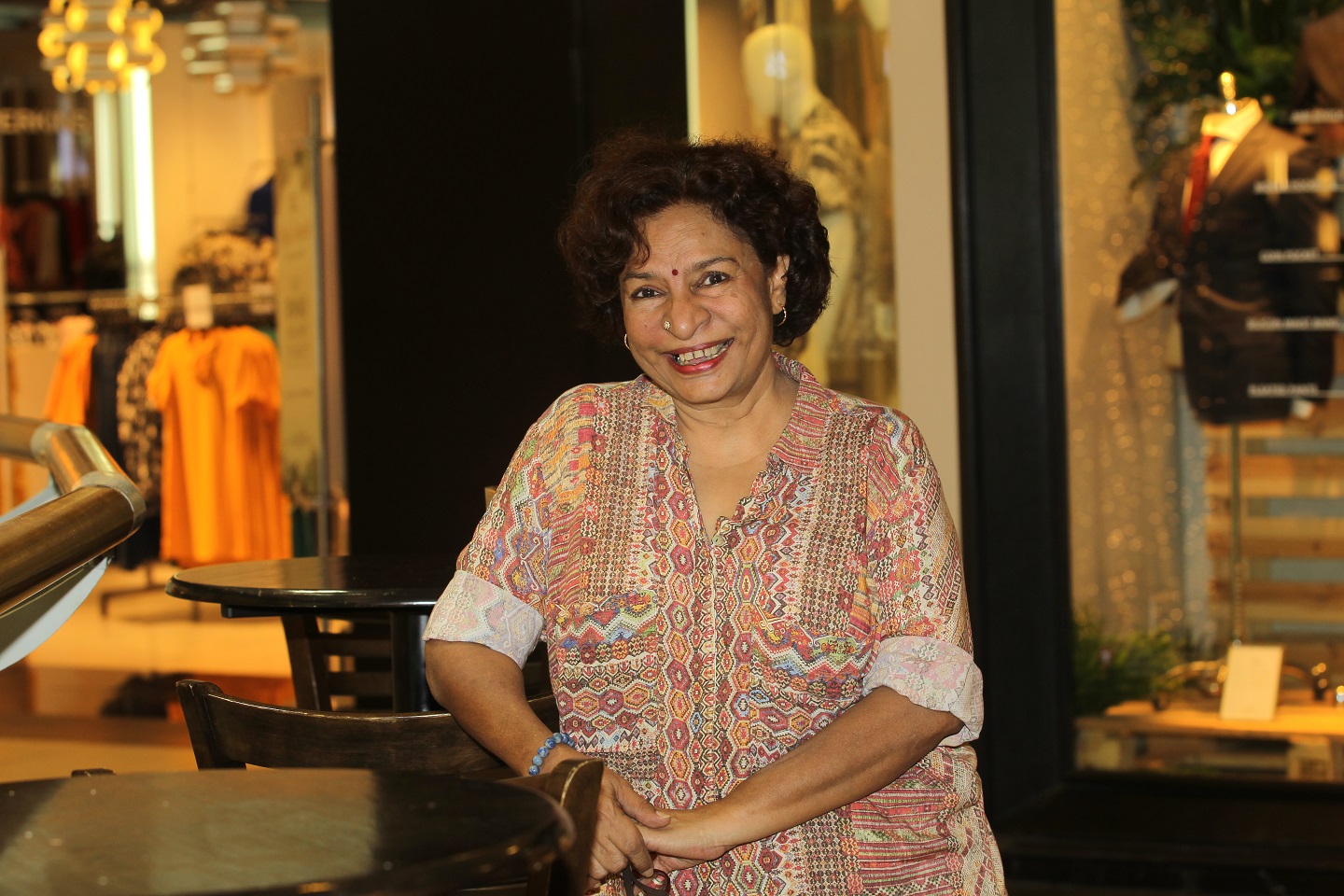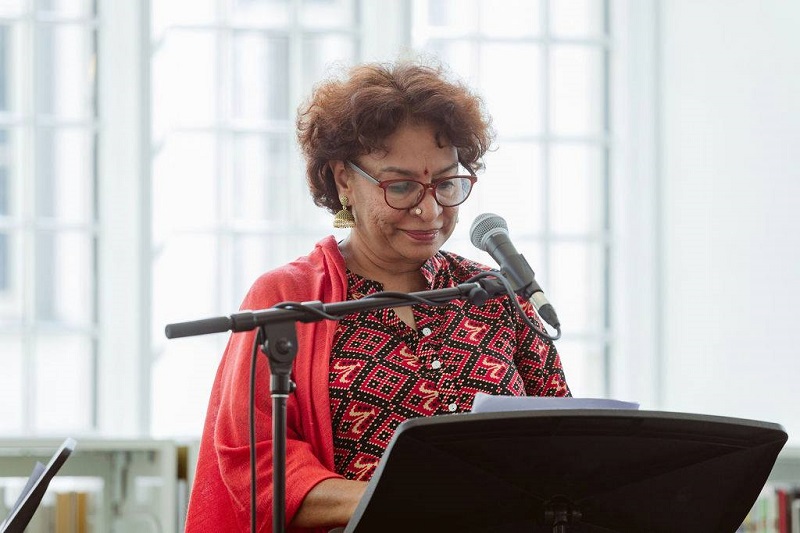
Saras Manickam won the regional Commonwealth Short Story Prize, an annual award for the best piece of unpublished short fiction from the Commonwealth (Photo: Haris Hassan/The Edge)
It would be all too easy to romanticise this story — people love underdogs. While Harry Potter is an unparalleled success, JK Rowling’s struggle to bring The Boy Who Lived to readers is a captivating narrative in itself, ready fodder for TV dramas with a biopic rumoured to be in the works.
Extending that same romanticism to Saras Manickam would not be far-fetched. A small-town girl who went on to become the first Malaysian to win the regional Commonwealth Short Story Prize might not capture as much attention as Rowling’s global phenomenon, but it is a success story to be proud of anyway … if she would frame it as such.
“I was an idiot, I was very blur and lazy,” she says matter-of-factly instead.
Now in its eighth year, the Commonwealth Short Story Prize is an annual award for the best piece of unpublished short fiction from the Commonwealth. Malaysian writers have done rather well on the Commonwealth literary scene: Shirley Geok-lin Lim (now based in America) was awarded the 1981 Commonwealth Poetry Prize while Rani Manicka and Tash Aw both took home the now-discontinued Commonwealth Writers’ Prize in 2003 and 2005 respectively. The Commonwealth Short Story Prize is the only prize in the world where entries can be submitted in 10 languages, from English and Malay to Greek, Swahili and Turkish.
The 2018 competition received over 5,000 entries from over 50 countries, and of the shortlist of 21 stories, a regional winner was chosen to represent Africa, Canada and Europe, the Caribbean, Asia and the Pacific. Two Malaysian entries were shortlisted, the other being Pengap by Lokman Hakim, translated by Adriana Nordin Manan. Surprisingly, all five regional winners are women, chosen by an international judging panel chaired by British novelist, playwright and essayist Caryl Phillips. Constantia Soteriou from Cyprus won the overall prize for her short story, Death Customs, at the award ceremony in Quebec, Canada, earlier this month, taking home a prize purse of £5,000 (RM26,770).
Saras was surprised to win the Asian component, having entered the competition, and several others, prior to this with little success. Born in Teluk Intan, Perak, she grew up with modest ambitions, though reading was a constant from girlhood to adulthood.
“Teluk Intan used to be picturesque, with the old railway station, a lot of greenery and the mak cik selling pisang goreng under the trees,” she reminisces. “It was idyllic in the way small towns are. I am the fifth child in a big family and was very much a bookish person. We had no money for them but somehow, there were always books in the house. I don’t know where they came from.
“I started with comics like Dandy and Beano and The Schoolgirl. We also had a lovely school library at the Convent of the Holy Infant Jesus. There was a television at home but it only had one channel, so we watched very little of it. I began reading fiction, starting with Enid Blyton and moving on to whatever was available. I read everything, even the foreign newspapers used to wrap vegetables from the market in those days. There was a Catholic priest, a Frenchman, at the church next to my school whom I remember with great affection. He lent me the Bhagavad Gita and Autobiography of a Yogi. He told me to read, read, read, and spoke to me as if I was an equal, worthy of his attention. He introduced me to Hinduism. I think he was a very unsuccessful Catholic priest,” she laughs.
Saras has a full, irreverent laugh she pulls out frequently. It reappears when she talks about reading English at University of Malaya in KL after Form Six and the thrilling experience of a small-town girl moving to the city for the first time.
“I grew a lot as a person but I was still an idiot,” she shakes her head. “I had a couple of short stories published in Her World but I was very self-conscious, so I submitted them under a pseudonym. I thought I was clever. But then I stopped writing.”
saras_speech.jpg

Her eldest son was born with special needs, which pushed her to find steady employment. She began teaching before working as a copywriter, writing and co-authoring school workbooks and textbooks. It allowed her to spend more time at home and live relatively comfortably, but the structured writing approach made it hard to switch back to fiction. Saras still taught on occasion, and while she has been largely freelancing since the early 1990s, she recently returned to the classroom to teach creative writing.
“Over the years, I had slowly started writing short stories again but with little success,” she says. “I didn’t win competitions, but I have to thank Raman Krishnan of Silverfish Books for including my stories in the anthologies he was publishing. I had no discipline; I wasn’t writing regularly. I had a ton of excuses, but even as I was grocery shopping or cooking or volunteering at the Bangsar Ria daycare centre [in KL] for the disabled, stories were brewing in my mind.”
To give her ideas concrete form, she attended workshops and joined a writing circle formed by writer and editor Sharon Bakar. “Five of us would meet at Sharon’s house. We would drink a lot of wine, eat, talk a lot and write a little. We didn’t actually get much done, but it did help me get started and I owe Sharon a lot for that.”
Since winning the runner-up position in the DK Dutt Memorial Award for Literary Excellence in 2017 (entries are published in the sports-themed Champion Fellas anthology) and the Commonwealth Short Story Prize for Asia, Saras has received numerous compliments about being a homegrown talent, but she believes the credit accorded to Malaysia is only partially true.
“I learnt best in programmes I attended overseas, to be honest,” she reveals. “I owe so much to Richard Katrovas, the founding director of the Prague Summer Program for Writers. It was largely attended by American writers and had fantastic teachers. It blew my mind, and each time I went, I learnt and grew exponentially.”
A residency in Switzerland offered similar opportunities for development, which she incorporated in reviewing her work.
“These gave me uninterrupted time to write. There are too many distractions at home, there’s always work to be done. When my youngest son was seven, he saw me hunched over, trying to finish some copywriting late at night and he said, ‘You know, mum, if you worked as a waitress, you would get more money’.” She bursts out laughing. “That’s of course not true but in his mind, I was always working and money would slowly come in. Anyway, in between all this, I would rework My Mother Pattu.”
My Mother Pattu is her winning entry for the Commonwealth Short Story Prize, a tale years in the making about a mother violently jealous of her daughter. The premise has remained the same over the years but Saras rewrote it over and over again, editing dozens of drafts until she felt it could be edited no further.
“I had submitted it to competitions before but it was never good enough,” she says candidly. “And it really wasn’t. The story was all over the place but it was a story that needed to be told, so I stuck to it. It is about a complicated woman who was lovely to people around her but horrible to her own family. Too many times, mothers and motherhood are placed on a pedestal but some people just shouldn’t have children. In the final version, I refused to judge or condone her — I just told her story. The person who wrote the first draft was very judgemental but the person who wrote the last is wiser and understands the nuances of humanity. The years change you — you have suffered, have been humbled, have gone through good and bad and that changes your world view. It’s still the same story but there’s more empathy now. Isn’t that interesting?”
The titular character is not based on any one real person or situation but is a composite of many women. “I think there were many Pattus in my life, though my own mother was nothing like her,” she says. “It is purely fiction, and I knew it was ready when I could do no more to it. The competition opened up right around that time and I thought okay, this is the best I can do, and sent it in. I was shocked when I was shortlisted, and completely overwhelmed when I won the Asian prize. It was too much to take in.”
Joining her fellow regional winners in Quebec was the cherry on top of an already delectable cake. “The quality of the writing was so high and it was a pleasure to concede top place to a story that was simply bigger and stronger,” says Saras.
“Instead of rivalry, we discovered a sisterhood of writers who sincerely embraced each other. What I will take away from the experience is the generosity of the fraternity that binds readers and writers.”
This article first appeared on Sept 30, 2019 in The Edge Malaysia.


